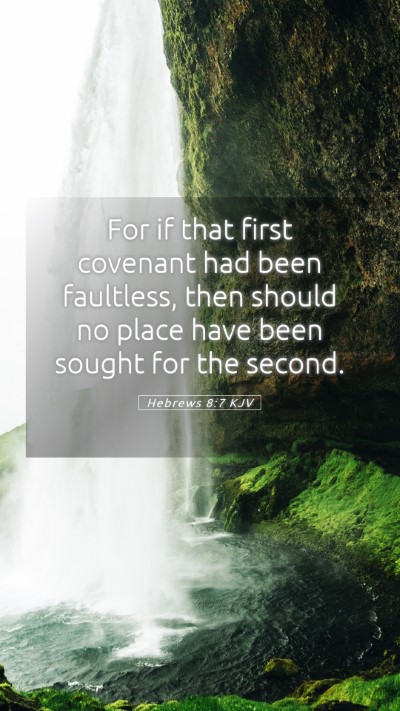Old Testament
Genesis Exodus Leviticus Numbers Deuteronomy Joshua Judges Ruth 1 Samuel 2 Samuel 1 Kings 2 Kings 1 Chronicles 2 Chronicles Ezra Nehemiah Esther Job Psalms Proverbs Ecclesiastes Song of Solomon Isaiah Jeremiah Lamentations Ezekiel Daniel Hosea Joel Amos Obadiah Jonah Micah Nahum Habakkuk Zephaniah Haggai Zechariah MalachiHebrews 8:7 Meaning
What is the meaning of Hebrews 8:7?
For if that first covenant had been faultless, then should no place have been sought for the second.
Hebrews 8:7 Bible Verse Meaning
Bible Verse Commentary: Hebrews 8:7
Understanding Scripture: Hebrews 8:7 states, "For if that first covenant had been faultless, then should no place have been sought for the second." This verse emphasizes the inadequacy of the old covenant in establishing a permanent and effective relationship between God and His people.
Overview: The verse serves as a critical transition within the context of the epistle, pointing towards the necessity of a new covenant to fulfill God’s promises. The first covenant, represented primarily by the Mosaic Law, had its limitations, and the verse highlights that these limitations necessitated the introduction of a second covenant.
Meaning of Bible Verses
This verse reveals important truths regarding the nature of God's covenants and their purposes in redemptive history.
- Imperfection of the First Covenant: The first covenant was perfect in its design but was rendered insufficient due to human inability to fully keep the law. The commentaries suggest that it pointed to need for grace.
- Transition to the New Covenant: The introduction of the new covenant through Jesus Christ signifies hope and renewal, allowing for a deeper relationship with God that is based on faith rather than works of the law.
- God's Faithfulness: While the first covenant had faults due to human unfaithfulness, God's intention is highlighted as being committed to ensuring His promises are fulfilled through Christ.
Biblical Exegesis
Contextual Analysis: The Book of Hebrews aims to reaffirm the supremacy of Christ and the new covenant. The author of Hebrews draws heavily from the Old Testament to make his case. By identifying faults in the first covenant, the author argues for the sufficiency and superiority of the new covenant (see also Jeremiah 31:31-34).
Bible Study Insights
Applying Bible Verses to Daily Life: Hebrews 8:7 encourages believers to reflect on their covenant relationship with God. Understanding the implications of living under the new covenant can alter how one approaches faith and obedience.
- Recognize the grace available in Christ that empowers believers to live righteously.
- Engage in practices that nurture this relationship, such as prayer, worship, and studying Scriptures.
- Share insights about God's faithfulness and the transformative power of the new covenant in discipleship settings such as Bible study groups.
Historical Context of Bible Verses
This verse also occupies a specific historical context in which early Christians, particularly those from Jewish backgrounds, struggled with the tension of leaving behind the old covenant traditions.
Cross References
Hebrews 8:7 can be linked to several correlating passages:
- Jeremiah 31:31-34: Prophecy of the new covenant.
- Hebrews 7:22: Jesus as the guarantor of a better covenant.
- Luke 22:20: Jesus announcing the new covenant through His blood.
Getting the Most from Your Bible Study
Utilizing Bible study tools can greatly enhance your understanding of this verse and others like it:
- Engage with online Bible study resources such as commentaries or discussion forums.
- Participate in Bible study courses that guide you through significant passages and their interpretations.
- Use Bible study guides that provide questions and reflections after reading key scriptures.
Conclusion
In summary, Hebrews 8:7 serves as a profound reminder of God's covenantal faithfulness and the necessity of the new covenant instituted in Christ. It challenges believers to move beyond the limitations of the law and embrace the freedom and grace found in their relationship with Jesus. Understanding this verse with the insights from public domain commentaries can deepen one's faith and commitment to living out these truths.


